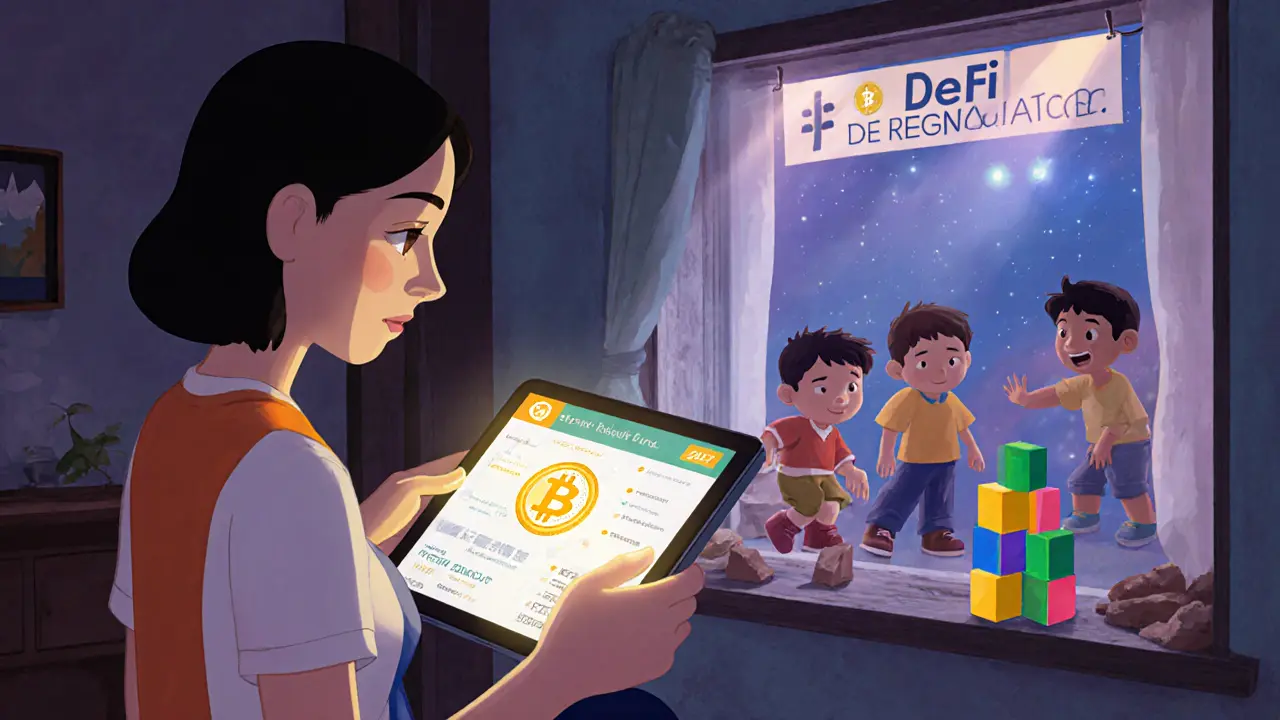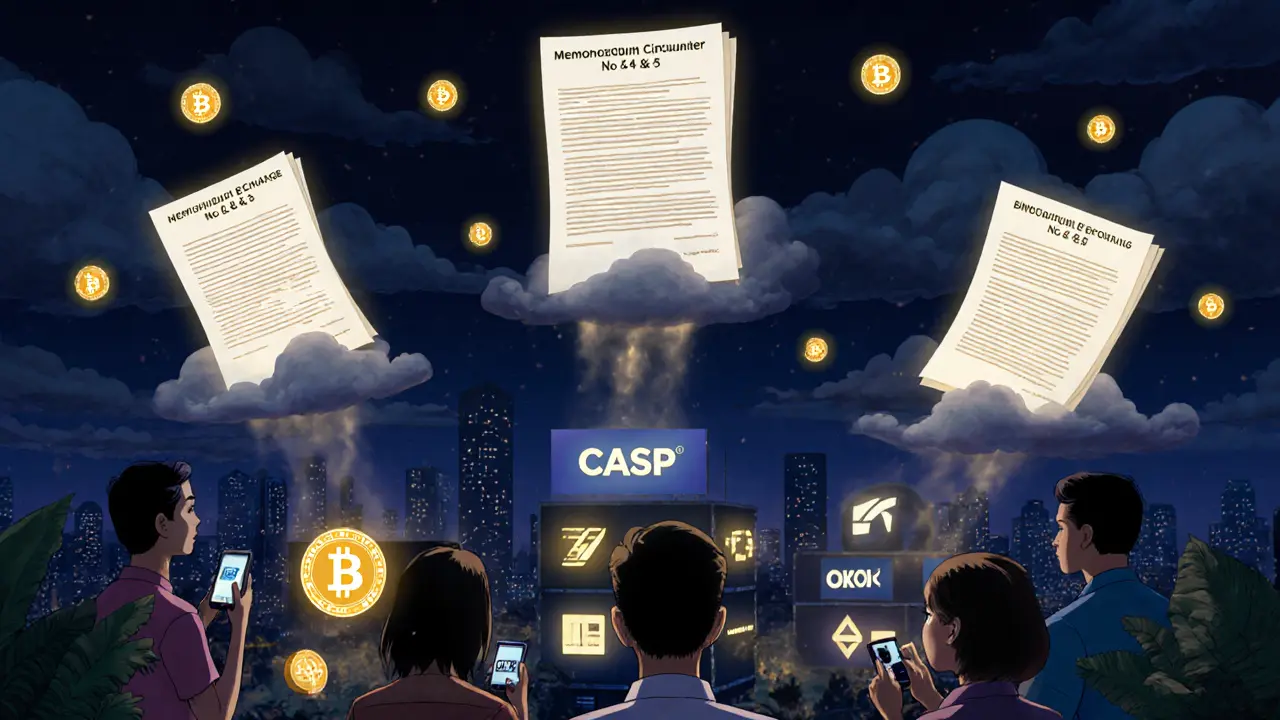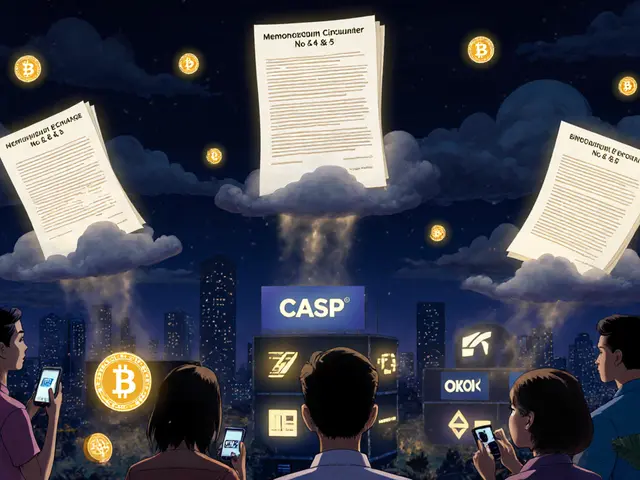CASP Registration Validator
Check if Your Crypto Platform is SEC-Registered
Verify if a crypto exchange is legally registered with the Philippine Securities and Exchange Commission (SEC) as a Crypto Asset Service Provider (CASP). Avoid unregistered platforms that could be blocked or shut down.
On July 5, 2025, the Philippines Securities and Exchange Commission (SEC) turned off the lights on dozens of unlicensed crypto exchanges. Not with a bang, but with a legal order that forced platforms like Binance out of the market - and now, they’re coming for OKX, Bybit, KuCoin, and Kraken. This isn’t a crackdown. It’s a cleanup. And if you’re a Filipino trading crypto, you need to understand exactly what’s happening - and why.
Why the SEC Acted
In 2022, the collapse of FTX sent shockwaves through global crypto markets. In the Philippines, it hit harder than most. Thousands of retail investors lost life savings. The Philippine National Police recorded a spike in crypto fraud cases. People weren’t just losing money - they were losing trust. The SEC saw what happened in other countries: unregulated platforms promising 20% monthly returns, then vanishing overnight. They decided enough was enough. The result? SEC Memorandum Circular No. 4 and No. 5, issued on May 30, 2025. These aren’t suggestions. They’re legal requirements. Every crypto service provider targeting Filipinos must now register as a Crypto Asset Service Provider (CASP). That means incorporation in the Philippines, a physical office here, and a minimum of ₱100 million (about $1.8 million USD) in paid-up capital. No exceptions.What the Rules Actually Require
The SEC didn’t just slap on a license. They built guardrails. Here’s what every CASP must do:- Segregate customer funds from company money - no more using your users’ crypto to cover operational costs.
- Keep 95% of customer assets in cold storage - offline, out of hackers’ reach.
- Use blockchain analytics tools to flag transactions over ₱50,000 (around $900 USD) for AML checks.
- Offer 99.5% platform uptime and process withdrawals within 72 hours.
- Submit monthly financial reports to the SEC’s PhiliFintech Innovation Office.
- Pass ISO 27001 cybersecurity audits - the same standard banks use.
The Enforcement Strategy
The SEC didn’t wait. On August 1, 2025, they publicly named ten unregistered platforms: OKX, Bybit, KuCoin, Kraken, LBank, CoinW, and six others. The same playbook used against Binance in 2024 is now rolling out again. Here’s how it works:- Public advisory: The SEC warns users: "This platform is not registered. Your money is at risk."
- App store removal: Google Play and Apple App Store are asked to delist the apps.
- ISP blocking: Internet service providers are ordered to block access to the platforms’ websites.
- Fines and jail time: First offense? Up to ₱10 million ($180,000 USD). Ongoing violation? An extra ₱10,000 ($180 USD) per day. Repeat offenders? Up to 5 years in prison and ₱2 million ($36,000 USD) in fines.

Who’s Affected - And How
Chainalysis estimates 15 million Filipinos hold crypto. Of those, 85% - over 12 million people - were using unregistered platforms. That’s not a small group. That’s the entire market. The immediate effect? A 30-40% drop in retail participation, according to the University of the Philippines. People are scared. Some are angry. Reddit threads like r/PhilippinesCrypto are full of posts like: "I can’t access my coins on Bybit anymore. What do I do?" But here’s what most people don’t say out loud: many of them lost money before. User "CryptoPH2020" on Reddit summed it up: "I lost 150,000 PHP on Celsius in 2022 - these rules might be strict but they’ll save others from the same fate." The SEC’s data shows a 67% drop in crypto fraud cases after Binance was blocked. That’s not just a number. That’s real people who didn’t get scammed.What This Means for Local Businesses
The rules aren’t just about shutting down foreigners. They’re about lifting up locals. Before, Philippine-based crypto startups couldn’t compete. Why? Because Binance, Bybit, and KuCoin had zero overhead. No office. No taxes. No compliance. They offered better rates, faster withdrawals, and no paperwork. Local players couldn’t match that. Now, the playing field is level. If you’re a Filipino company and you meet the CASP requirements, you can operate legally - and attract users who now trust the system. The SEC even created a dedicated registration portal with video tutorials in Tagalog and English. They’re holding weekly town halls. They’ve set up a 24/7 hotline. But here’s the problem: only about 12 out of 240 active platforms in the Philippines meet the full requirements. The capital requirement alone - ₱100 million - is a wall for most startups. Experts say this could reduce competition and push innovation overseas.
What’s Next?
The SEC isn’t done. By Q1 2026, they plan to launch the Crypto-Asset Investor Compensation Fund. It’ll be funded by a 0.05% fee on CASP gross revenue. Projected annual income: ₱250 million ($4.5 million USD). If a registered platform fails, users could get partial reimbursement. And by 2027, the SEC plans to bring DeFi under regulation. Smart contracts, liquidity pools, yield aggregators - all of it. Commissioner Maria Lourdes Limgenco said during a Senate hearing: "The next phase will address smart contract risks and liquidity pool vulnerabilities." The goal isn’t to kill crypto. It’s to make it safe. The Philippines is now one of the strictest crypto markets in Asia - second only to China’s outright ban. But unlike China, they’re not shutting it down. They’re trying to fix it.What Should You Do?
If you’re a Filipino crypto user:- Check if your platform is on the SEC’s official list of registered CASPs. (They publish it monthly.)
- If you’re on an unregistered platform, withdraw your funds ASAP. Don’t wait for the block.
- Don’t use VPNs to access blocked sites. That puts you back in the danger zone.
- Only invest in platforms that show their SEC registration number and physical office address.
- If you’re offered more than 20% annual yield, walk away. It’s not a bonus - it’s a red flag.
- Start the CASP registration process now. It takes 90-120 days.
- Get your ISO 27001 certification. Don’t delay.
- Set up your physical office. The SEC will verify it.
- Use the SEC’s free webinars and support tools. They’re there to help.
Is This a Ban?
No. Commissioner Kelvin Lee made it clear: "The CASP Rules do not prohibit cryptocurrency trading or investment." You can still buy Bitcoin, Ethereum, Solana - just not through unregulated platforms. The SEC isn’t trying to stop you from trading. They’re trying to stop you from getting ripped off. The market may shrink. Transaction volume could drop 35-40% in the short term. But long-term, Fitch Ratings predicts lower volatility and more stability. That’s good for everyone - especially the 68% of users who use crypto for remittances, not speculation. This isn’t about control. It’s about care.Are crypto exchanges banned in the Philippines?
No, crypto exchanges aren’t banned - but unregistered ones are. Only platforms that register as Crypto Asset Service Providers (CASP) with the SEC can legally operate in the Philippines. Platforms like Binance were forced to leave because they refused to register. New platforms can still join if they meet the SEC’s requirements.
Can I still trade crypto in the Philippines?
Yes. You can still buy, sell, and hold cryptocurrencies. The SEC hasn’t banned crypto trading. What they’ve banned are unregulated platforms that don’t protect your money. You just need to use a registered CASP. The SEC publishes a list of approved providers monthly.
What happens if I use an unregistered exchange?
You’re not breaking the law - the exchange is. But if the platform gets blocked or shuts down, you could lose access to your funds. The SEC doesn’t protect users on unregistered platforms. If Bybit or KuCoin disappears tomorrow, you won’t get your money back. That’s why the SEC warns against using them.
How do I know if a crypto platform is registered?
Check the SEC’s official website for the current list of registered CASPs. Each registered platform must display its SEC registration number on its website and app. If you can’t find it, assume it’s not registered. You can also call the SEC’s Enforcement and Investor Protection hotline at +632-8981-7963 to verify.
Will this make crypto less accessible in the Philippines?
Yes, in the short term. Many global platforms have left, and new ones will take time to register. But the SEC argues this will reduce fraud and protect ordinary investors. Over time, more local platforms are expected to emerge, offering secure, regulated services. The trade-off is fewer options now for stronger protections later.
What’s the difference between a CASP and a regular financial institution?
A CASP is specifically for crypto services - trading, custody, staking, etc. It’s not a bank. But like banks, CASPs must segregate customer funds, maintain high cybersecurity standards, and report to regulators. The key difference is that CASPs are regulated under crypto-specific rules, not traditional banking laws. They’re designed to fit the unique risks of digital assets.
Is staking crypto still allowed in the Philippines?
Yes - but only if the platform is registered as a CASP and the yield doesn’t exceed 20% annual percentage yield (APY). Any staking or lending product offering more than 20% requires special SEC approval. Most global platforms offered 5-15% - which is still allowed. Anything above 20% is now considered high-risk and needs extra scrutiny.
Can I use a VPN to access blocked exchanges?
Technically, yes - but it’s risky. The SEC warns that using a VPN to access unregistered platforms puts your funds at risk. These platforms aren’t regulated, so if they collapse, you have no recourse. The SEC also says using a VPN doesn’t make the platform legal. You’re still exposed to fraud, hacking, and loss. It’s not worth the risk.
When will DeFi platforms be regulated in the Philippines?
The SEC has signaled that DeFi protocols - like Uniswap or Aave - will be regulated by 2027. Right now, they’re exempt because they’re decentralized. But the SEC says smart contracts and liquidity pools pose real risks to retail investors. Future rules will likely require DeFi aggregators and wallet providers to register if they target Filipino users.
Will this hurt the Philippine crypto economy?
Short-term, yes. Transaction volume is expected to drop 35-40% as users adjust. But long-term, the SEC believes the market will become more stable and trustworthy. Fitch Ratings projects growth will slow from 22% to 14% annually, but with far less volatility. The goal isn’t to maximize growth - it’s to protect people. For a market where most users rely on crypto for remittances, safety matters more than speed.

